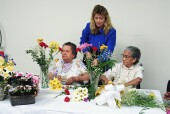Depression, PTSD Common Among Lung Transplant Patient Caregivers
They're 4 to 5 times more likely to suffer symptoms, but trained counselors could help.
|
E-mail this article
Subscribe to news
Printer friendly version
|

(SOURCE: American Thoracic Society, news release, May 18, 2008)
SUNDAY, May 18 (HealthDay News) -- Caregivers of deceased lung transplant patients are four to five times more likely to suffer symptoms of depression and post-traumatic stress disorder (PTSD) than the average person, researchers report.
The findings, to be presented at the American Thoracic Society's 2008 International Conference in Toronto on May 19, come from assessing caregivers of all University of Washington lung transplant recipients who had died within the past five years.
"The caregivers we studied had rates of depressive symptoms of 21 percent and of PTSD symptoms of 32 percent, compared to the average in the general population of 6 to 7 percent," study author Dr. Cynthia Gries, of the Division of Pulmonary and Critical Care Medicine at the University of Washington School of Medicine, said in a prepared statement. "This suggests that there is a significant burden of psychological symptoms in family members which has previously been unrecognized."
The study also found that family members who perceived that their loved one had either a lower quality of dying and death or poorly controlled pain symptoms were more likely to have symptoms consistent with PTSD.
"Most people don't realize that prior to wait-listing a patient as a lung transplant candidate, a caregiver plan must exist to support the patient through the entire process," Gries said. "That process can be lengthy and grueling for the caregiver as well as the patient, resulting in much higher rates of depression and PTSD symptoms.
Gries said trained counselors who meet with family members could help them cope with emotional and financial issues while reducing the stress put on caregivers.
More information
The U.S. National Institute of Mental Health has more about post-traumatic stress disorder.
Copyright © 2008 ScoutNews, LLC. All rights reserved. 
HealthDayNews articles are derived from various sources and do not reflect federal policy. healthfinder.gov does not endorse opinions, products, or services that may appear in news stories. For more information on health topics in the news, visit the healthfinder.gov health library.